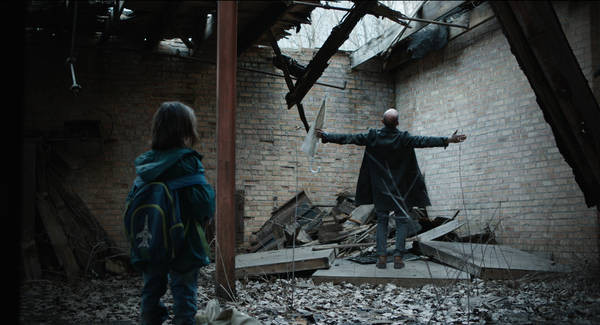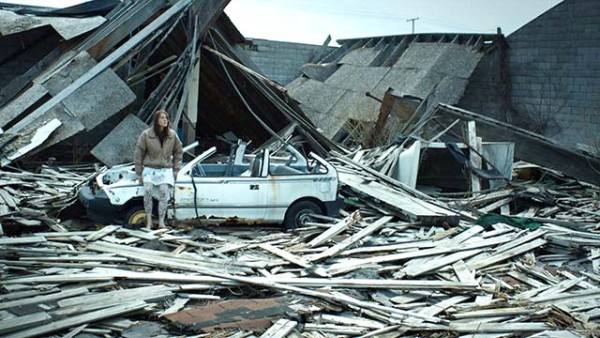
Courtesy of Chaotic Good
At least once a year at Fantasia Fest, a film comes along like a wolf in sheep’s clothing, promising genre conventions and eschewing them for something altogether different. That’s Embers.
Let’s bitch it out…
A quick glance at the description for Embers suggests that it is a post-apocalyptic film. This is not incorrect, but the infection that has decimated society is actually something much subtler: memory loss. Much like José Saramago’s Blindness, Embers is interested in exploring what happens when we lose our memory – of ourselves, of our loved ones, essentially of our lives. The result is a deeply contemplative and breathtakingly human film.
The evocative science fiction premise is little more than a ruse to explore a world without memories. The look of the film, abandoned buildings falling into decay, filled to the brim with the objects of forgotten lives. It is a sad, grim looking world, but completely appropriate. Without the necessary upkeep, the world around the characters has decayed; now it is simply a landscape of memories from the past.
We are thrown into the mix of things from the opening scene: a man and a woman wake up in a decaying apartment without any idea who they are, who the other is or what happened to them. They must work out the details of their identities – a process not unlike the experience of watching a film for the first time. Eventually they settle on the specifics: he is Ben, she is Jenni and they are lovers who intended to be together (evidenced by the matching material they wear on their wrists). There’s a painful comedy at play here, especially when we see the same routine play out later in the film. These are the arbitrary decisions that we require in order to live and love, but they are subject to the whims of the day (later he becomes Max and she becomes Katie). The truth is unimportant except for the fact that they have each other. It is inevitable that the pair will be separated at some point and the moment that one forgets the other and simply moves on is heartbreaking and full of despair. Theirs is a love that neither can remember and yet we, as an audience, cheer for their reunion unequivocally.

Courtesy of Chaotic Good
The Man and the Woman (as they are credited) are not the only characters. There is a wandering mute boy who is adopted by every adult he meets, a noted academic who has outfitted his entire home with strings (to avoid getting lost) and post-it notes (to remember how to do household activities like make fire). There is also a very disturbed young man who does nothing other than destroy objects he comes into contact with and, finally, a father/daughter pair living in a bunker away from the infection. It is this pair who are the saddest, most pathetic humans in the film: their lives are filled with empty art galleries and cello performances for audiences of one. They have their memories, and the burden of the memories of those they have lost, but they are not living. Inside the bunker, with the weight of the world, they live only to remember, unlike the forgetful folks who live above ground who can literally only live in the moment.
The fact that such a dark premise can hold so many uplifting, hopeful moments was touched upon in the Q&A with first time feature director Claire Carré following the screening. Carré, who explained that her desire to explore the subject originates with her own obsession with nostalgia and the past, explained that there’s something vital about being made to live for the moment. As proof, she cited Embers’ most evocative scene: the Man and the Woman find an abandoned church and watch the sun set through its stained glass window, their faces basking in the coloured rays as they make love. It is a gorgeous moment filled with emotion, even more so when you realize that they won’t remember it when they wake up the next morning. They experienced the moment, lived and loved it, and their loss of memory doesn’t diminish that.
Bottom Line: Embers is quite possibly the most “human” of post-apocalyptic films: the stories of these survivors is low on plot and heavy on symbolism, the screen filled with moments and feelings rather than set pieces and action.
Embers screens once more at Fantasia Festival on August 1 at 12:45pm. Check out the trailer here: